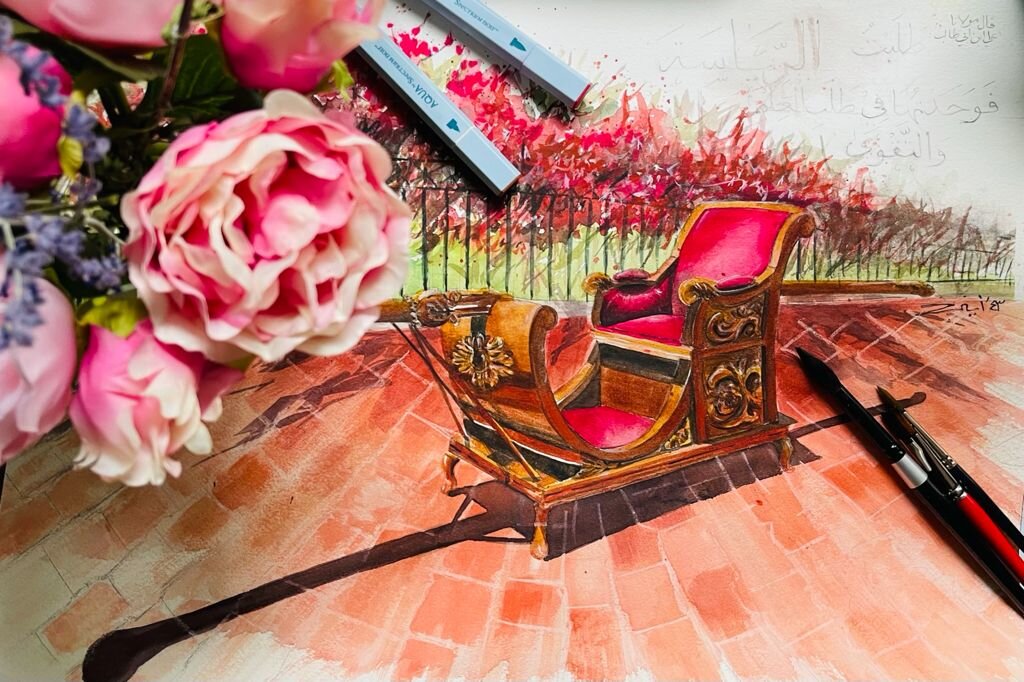The Royal Miyana (Palkhi or palanquin)
Size: 14" x 20" // Medium: Watercolours on Cotton Arches Watercolour Paper
Location: Galyakot Mazar-e-Fakhri
Based on the first kalam of Ameerul Mumineen Ali ibne Abi Talib SA from the Talabto series:
طلبت الرياسة فوجدته في طلب العلم والتقوى
I sought Supremacy and found it in seeking Knowledge and Taqwa.
The richly carved wooden palkhi, palanquin, in Galiyakot, Taherabad, symbolizes leadership. Its two elongated arms suggests the protection and reach provided by the leader, as does the fence above.
The velvet seats are painted using crimson, a colour that symbolizes royalty and influence. Crimson is also associated with humility, shown as the shadow below, illustrating that a higher power is always watching over and that one’s actions always set examples for others.
A leader bears a heavy weight of responsibility. It means having accountability not only for great accomplishments and managing deadlines, but also for how you get work done. A leader has to remember that all their actions have consequences that affect the hearts, belief systems and intellects of those they lead.
The literature talks about several kinds of leadership styles, to name a few:
Autocratic Authoritative Pacesetting Democratic Coaching Affiliative Laissez-Faire
Leading responsibly means leading with awareness of your own leadership approach and asking yourself whether you lead from a loving heart, your default beliefs or from a growing intellect.
Does your leadership style exude a feeling of superiority and judgmentalism by treating others as lesser beings making them feel incapable and weak?
Does your leadership approach exude a sense of inadequacy and compels you to prove yourself repeatedly to those you feel know more than you, resulting in others taking you for granted?
Does your leadership style generate ease by treating others with love and respect, making them feel loved and valued?
I found evidence in favour of the third leadership approach in the first waaz of Moharram al Haram 1443H, by al Dai al Ajal Syedna Mufaddal Saifuddin TUS, which introduced the concepts of “spiritual leadership” by drawing upon the ‘spiritual laws of leadership’ identified by Imam Ali Ibn Abi Talib AS, who summarised the qualities of leadership in just two sentences:
Imam Ali AS states “I sought leadership and found it in the seeking of knowledge and taqwa (fear of Allah — that Allah is watching over my actions).”
Syedna TUS elaborated this quote further by stating that one should reach the highest level in their fields by acquiring the appropriate knowledge and by practicing taqwa. If a leader of their country, company, society or house wants to lead effectively, they must bear in mind two things:
Acquiring the correct knowledge.
Ensuring that their subordinates are also educated in their respective fields so that each one of them prospers — in contrast to leaders who keeps their followers ignorant by thinking that would work to their advantage.
He further encouraged his followers to seek all kinds of useful knowledge and skills in all fields so that the Dawoodi Bohra community may collectively prosper.
A few other principles for successful leadership were that leaders of companies should make the laws/rules easy to follow by their employees rather than making them sound like obligations, as those would be followed with love. As well as treating employees like a friend would treat his friend, as this fosters a sense of goodwill and loyalty. However, also suggesting that a sound political strategy incorporates oscillating between the two polarities of being appeasing and distancing with employees.
The above approach therefore, suggests a leadership style that is grounded in knowledge and growth as well as valuing the individuals involved as this approach is backed by the fear that one is answerable to Allah TA for his actions, making one strive for a firm yet loving approach that makes the followers feel at ease, valued and at the same time conscious about their own development and actions!


